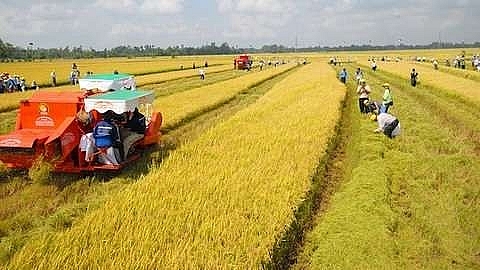Improved business climate helps economy
 |
| Improved business climate helps economy |
GSO’s General Director Nguyen Bich Lam said at the conference on Thursday that the economy had a very impressive year with record growth of the agro-forestry-fishery sector, new firms, foreign tourist arrivals, disbursed foreign direct investment and trade surplus.
The Vietnamese economy scale reached VND5.535 quadrillion (US$240 billion) with GDP per capita at $2,587, up by $198 over 2017, according to GSO.
Of note, the economic growth quality also improved significantly, Lam said.
The total factor productivity (TFP), which measures the contribution of supply-side production factors to economic growth, contributed 43.5 per to GDP growth and averaged 43.29 per cent in the 2016-18 period, much higher than the average of 33.58 per cent of the 2011-15 period. Labour productivity was estimated at $4,522, up by $346 over the previous year.
The incremental capital output ratio (ICOR) (the additional capital required to increase one unit of output) receded from 6.11 in 2017 to 5.95 in 2018, reflecting that capital efficiency improved, Lam said.
In overall GDP growth, the agro-forestry-fishery sector contributed 8.7 per cent, the industry and construction sector 48.6 per cent and the services sector 42.7 per cent.
The country ran a record surplus of $7.2 billion in 2018, of which, the domestic sector posted a trade deficit of $25.6 billion and the foreign-invested sector a trade surplus of $32.8 billion (including crude oil).
However, the export growth of the domestic sector was higher than the foreign-invested sector, Lam said, citing statistics that the export growth of the former was 15.9 per cent, higher than 12.9 per cent of the latter.
Regarding foreign direct investment (FDI), despite a fall of 13.9 per cent in registered capital to $25.57 billion, the disbursed capital reached a record of $19.1 billion, up by 9.1 per cent over 2017, statistics showed.
According to Lam, the improved business climate and positive results of the economic structure transformation were major drivers for economic growth in 2018.
Lam added that the economic growth momentum would continue in 2019 and the National Assembly’s economic growth target at 6.8 per cent could be achieved.
Lam said that Viet Nam needed to focus on improving its business climate and hastening administrative procedures to create favourable conditions for businesses and reviewing the legal system for adjustments to effectively implement new-generation free trade agreements. In addition, the country should also attach special attention to promoting the application of advanced technologies.
Inflation target fulfilled
Viet Nam’s consumer price index (CPI) rose by 3.54 per cent, fulfilling the National Assembly’s target of keeping CPI at below 4 per cent in 2018.
GSO’s statistics showed that CPI dropped by 0.25 per cent over the previous month.
Significant drops in fuel prices dragged down the CPI in December.
In the domestic market, petrol prices were reduced twice in December with a total decrease of VND1,830 per litre for Ron A95 and VND1,840 for biofuel E5. On average, petrol prices dropped by 10.77 per cent against November. Drops in fuel prices made transportation services prices fall by 4.88 per cent in December.
Gas prices also fell by 9.64 per cent.
Transportation and housing and building materials were the only two categories in 11 categories of the CPI product basket to see drops in prices in December.
Core inflation (excluding food, fresh foodstuffs, energy, healthcare and education services) rose 1.48 per cent in 2018, fulfilling the target of capping the index at below 1.6 per cent, reflecting the effectiveness and stability of the monetary policies, GSO said.
What the stars mean:
★ Poor ★ ★ Promising ★★★ Good ★★★★ Very good ★★★★★ Exceptional
Related Contents
Latest News
More News
- State corporations poised to drive 2026 growth (February 03, 2026 | 13:58)
- Why high-tech talent will define Vietnam’s growth (February 02, 2026 | 10:47)
- FMCG resilience amid varying storms (February 02, 2026 | 10:00)
- Customs reforms strengthen business confidence, support trade growth (February 01, 2026 | 08:20)
- Vietnam and US to launch sixth trade negotiation round (January 30, 2026 | 15:19)
- Digital publishing emerges as key growth driver in Vietnam (January 30, 2026 | 10:59)
- EVN signs key contract for Tri An hydropower expansion (January 30, 2026 | 10:57)
- Vietnam to lead trade growth in ASEAN (January 29, 2026 | 15:08)
- Carlsberg Vietnam delivers Lunar New Year support in central region (January 28, 2026 | 17:19)
- TikTok penalised $35,000 in Vietnam for consumer protection violations (January 28, 2026 | 17:15)

 Tag:
Tag:




















 Mobile Version
Mobile Version